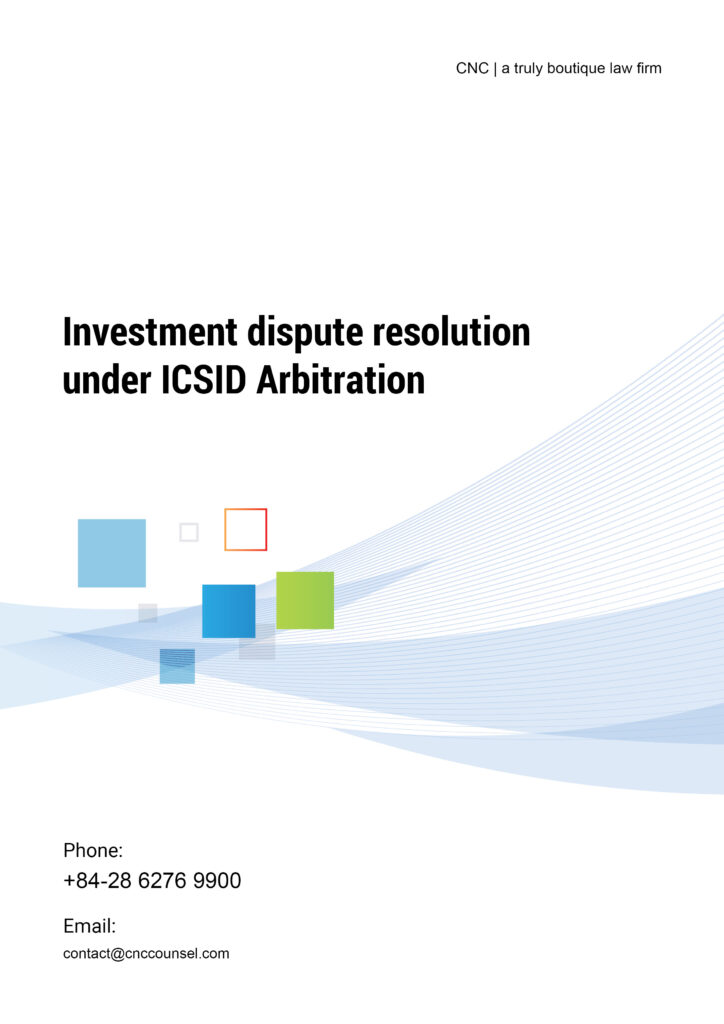Investment dispute resolution under ICSID Arbitration
A healthy investment environment is one of the key factors contributing to the explosive growth of international investment. In this context, the right to file claims and petitions against the host country’s acts of violation or disadvantageous policies are always a matter of great importance to investors.
Overall, different from conventional arbitration, international investment arbitration has distinct characteristics since one of the involved parties is the government of a country – an entity typically enjoys judicial immunity.
Accordingly, one of the more widely chosen frameworks for investment arbitration is the ICSID Arbitration Rules. In this article, CNC provided a general overview of ICSID Arbitration and arbitral proceedings under its rules.
Investment dispute resolution mechanism under ICSID Arbitration
What is ICSID?
International Centre for Settlement of Investment Disputes (“ICSID”) was established in 1966 under the Convention on the Settlement of Investment Disputes between states and nationals of other states (“ICSID Convention”). ICSID is one of the five organizations that make up the Work Bank Group, alongside the International Bank for Reconstruction and Development (“IBRD”), International Development Association (“IDA”), International Finance Corporation (“IFC”), Multilateral Investment Guarantee Agency (“MIGA”).[1]
ICSID is a leading institution for resolving disputes between host countries and foreign investors via Arbitration and Mediation. As an independent, apolitical and efficient dispute resolution body, ICSID’s goal is to aid the host country and foreign investors in their amicable resolution of disputes while preserving the relationship between the parties.[2]
What is ICSID Arbitration?
ICSID Arbitration is a term used to refer to arbitral proceedings performed under the protection of ICSID and established based on Article 1 of ICSID Convention.
Accordingly, the ICSID arbitral proceedings are governed by the following four rules: ICSID Convention, ICSID Institution Rules (“Institution Rules”), ICID Arbitration Rules 2022 (“Arbitration Rules”) and ICSID Administrative and Financial Regulations. Each would have their own scope as follows:
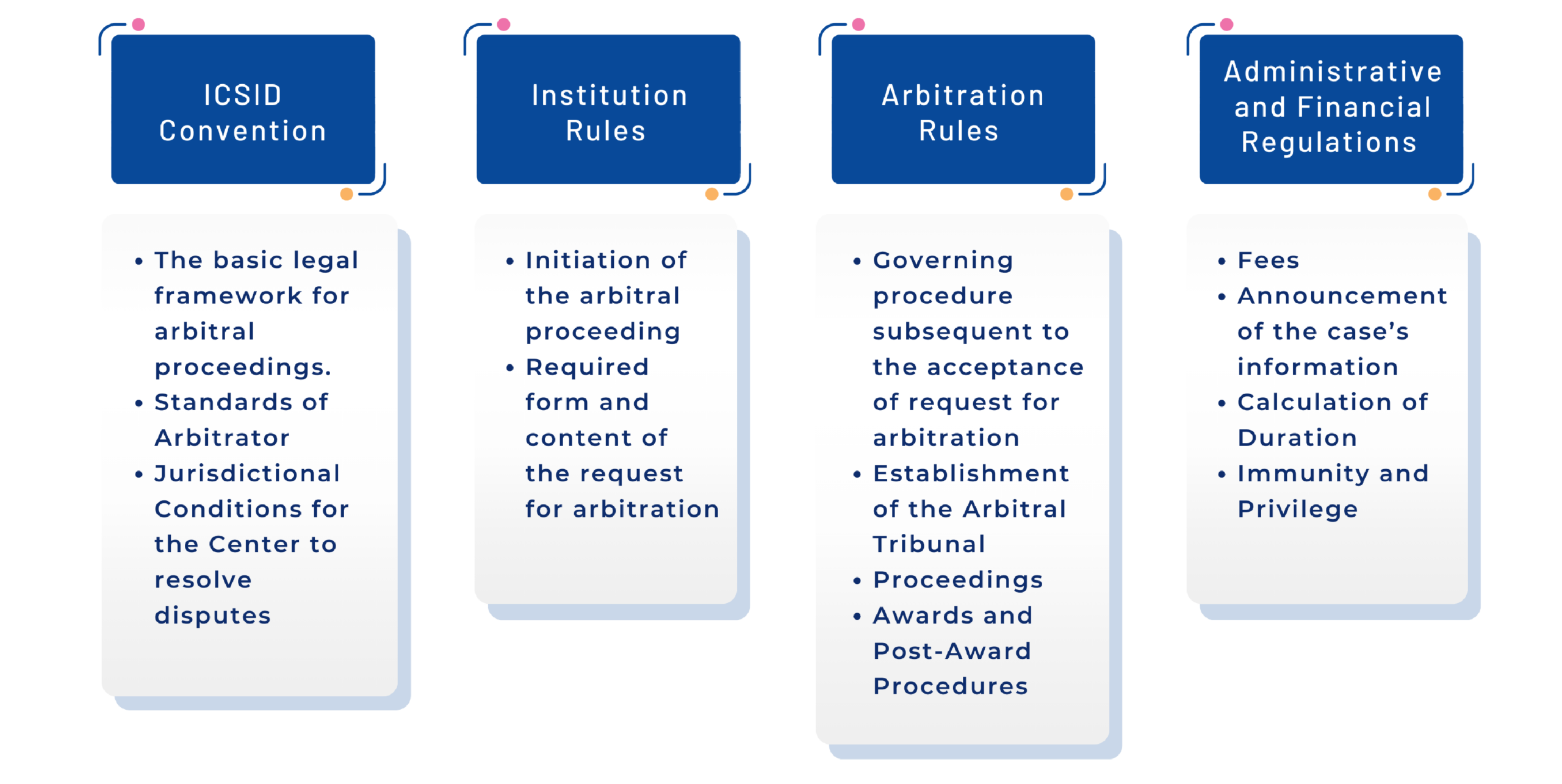
Four Rules on ICSID arbitral proceedings
Although there are 4 governing rules in total, the two primary ones that govern the ICSID arbitral proceedings are: (i) Institution Rules, and (ii) Arbitration Rules.
ICSID is applicable to which types of disputes?
A distinctive feature of dispute resolution via ICSID Arbitration is that this mechanism is tailored specifically for the resolution of disputes between Host Countries and Foreign investors (also known as Investor-state dispute settlements). However, disputes between states or solely between foreign investors are not within the jurisdiction of ICSID.
Investment Dispute Resolution process under ICSID Arbitration
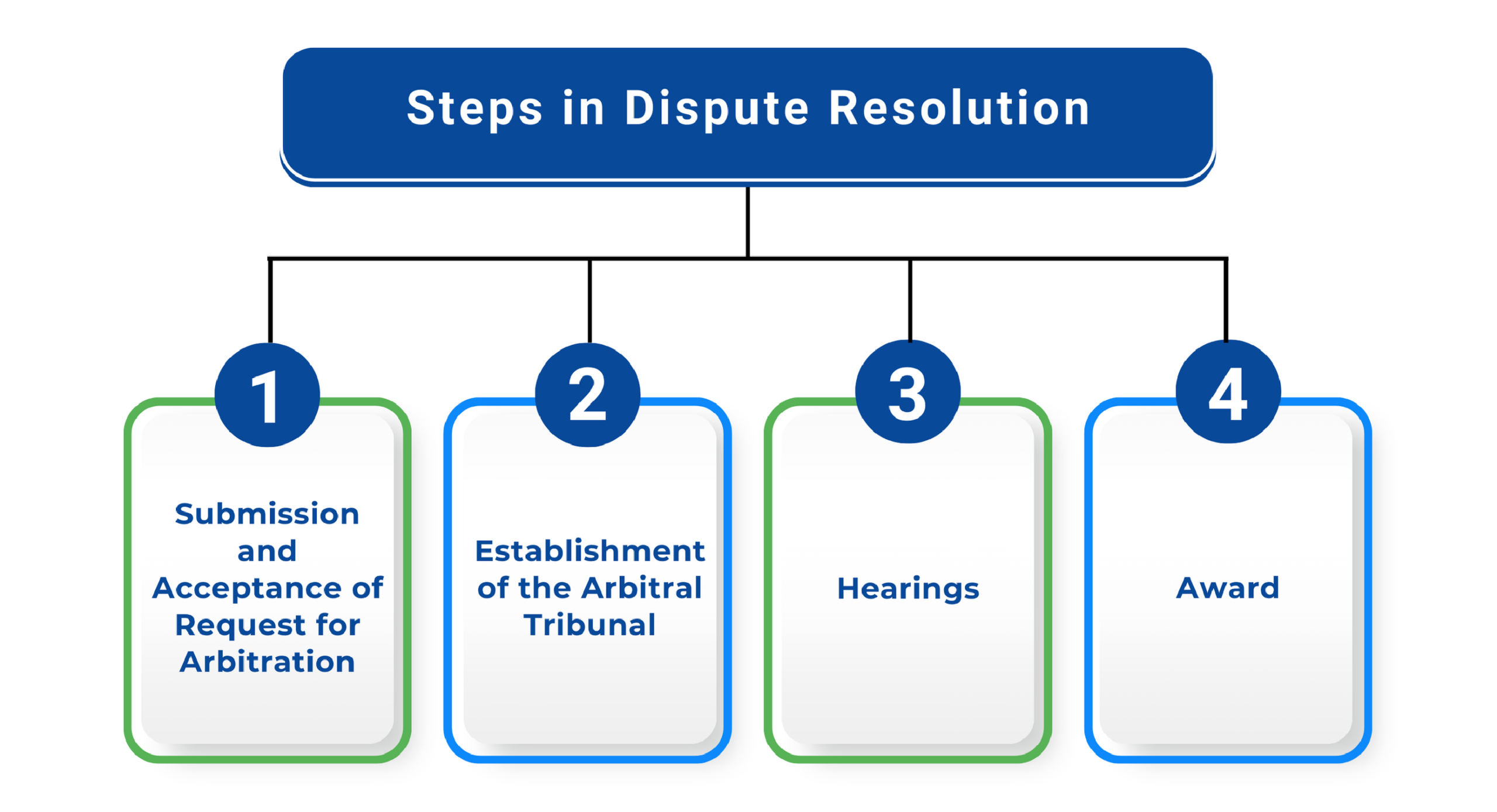
Investment Dispute Resolution process under ICSID Arbitration
Submission and Acceptance of Request for Arbitration
Submission of Request for Arbitration
The Claimant shall submit the request for arbitration to the Secretary-General of the International Centre for Settlement of Investment Disputes and pays the lodging fee.[3] Afterwards, the Secretary-General sends a copy of the request to the other party so that the other party is informed of the Claimant’s request, including information concerning the issues in the dispute, the identity of the parties and their consent to arbitration[4]
Review and acceptance of request for arbitration
After receiving the request for arbitration and lodging fee from the Claimant, the Secretary-General reviews the request for arbitration per Article 36 (3) ICSID Convention and Rule 6 of Institution Rules
Review
The Secretary-General immediately determines whether or not the dispute(s) is within the jurisdiction of ICSID. The determination shall be made based on the information contained in the request for arbitration. If the Secretary-General finds any failure to fulfill any of the conditions listed in Article 25 of ICSID Convention[5], the Secretary-General refuses the request for arbitration. Vice versa, the Secretary-General issues a notice of acceptance.
Within approximately 3 weeks, the Secretary obtains any necessary clarification, additional information or documents from the claimant.[6]
Acceptance
After the review of request for arbitration by the Secretary-General, there are two possible outcomes”
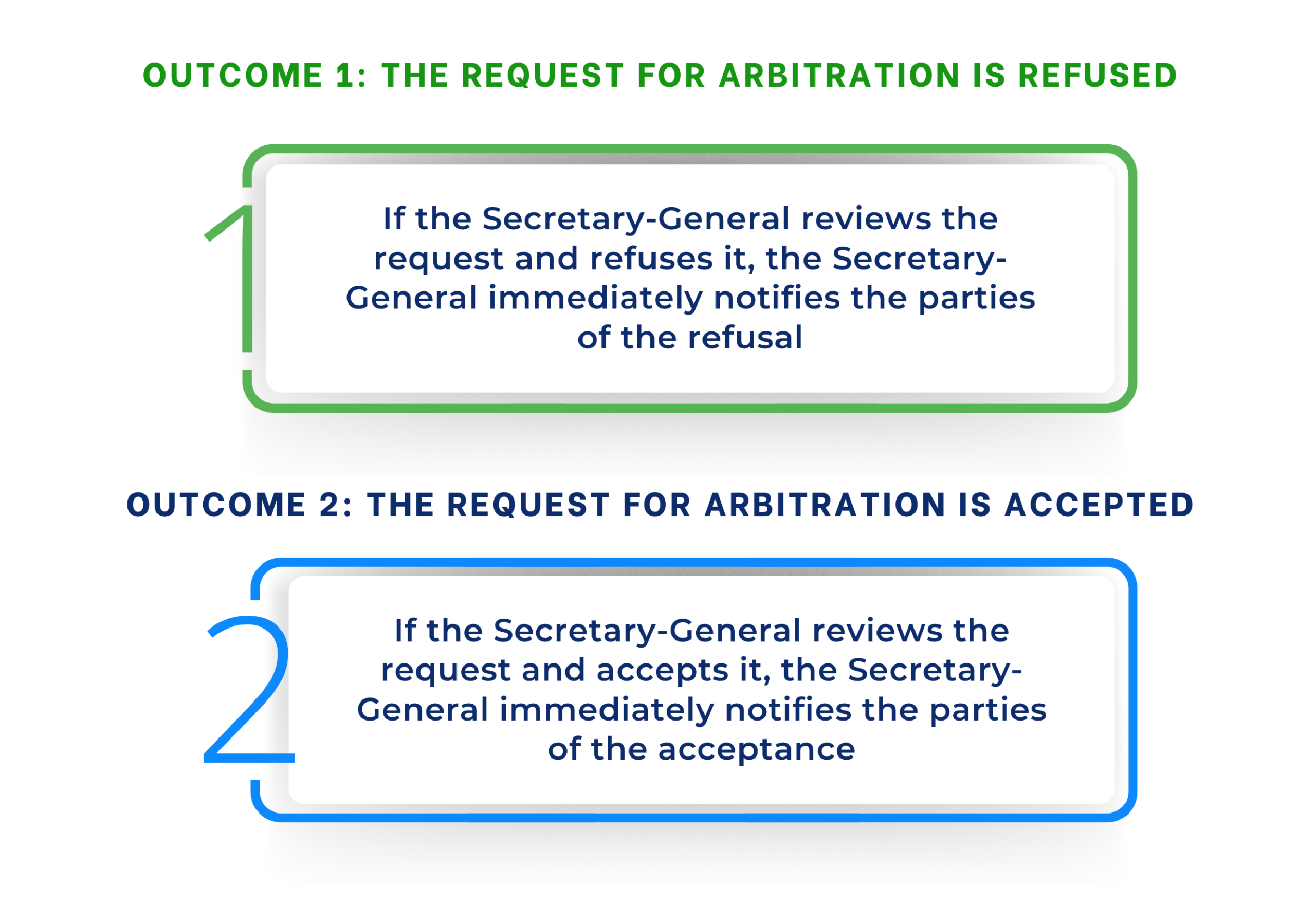
Two possible outcomes after the review of request for arbitration
If the request for arbitration is accepted, immediately afterward, the procedure for establishment of the Arbitral Tribunal begins and the Arbitration Rules are applied from this point onwards.
Establishment of the Arbitral Tribunal
Arbitrator Appointment Methods and Number of Arbitrators
The Parties should agree on the number of arbitrators and methods for appointing an arbitrator. Should the parties not agree on the above items, ICSID Convention shall be applied for the determination of the number of arbitrators, as well as appointment of the arbitrator
Agreements between Parties
Parties should specify the arbitrator appointment methods, as well as the number of arbitrators in the contract, or the applicable investment protection agreements and domestic laws for these matters.
It should be noted that the Arbitral Tribunal might consist of either the sole arbitrator or multiple arbitrators depending on the agreement. However, there must always be an odd number of Arbitrators.[7]
ICSID Convention
Within 45-days of the accepted request for arbitration, if the parties are not in agreement on the arbitrator appointment method and the number of arbitrators, the appointment method specified in Article 37(2)(b) of the Convention is applied, accordingly[8]:
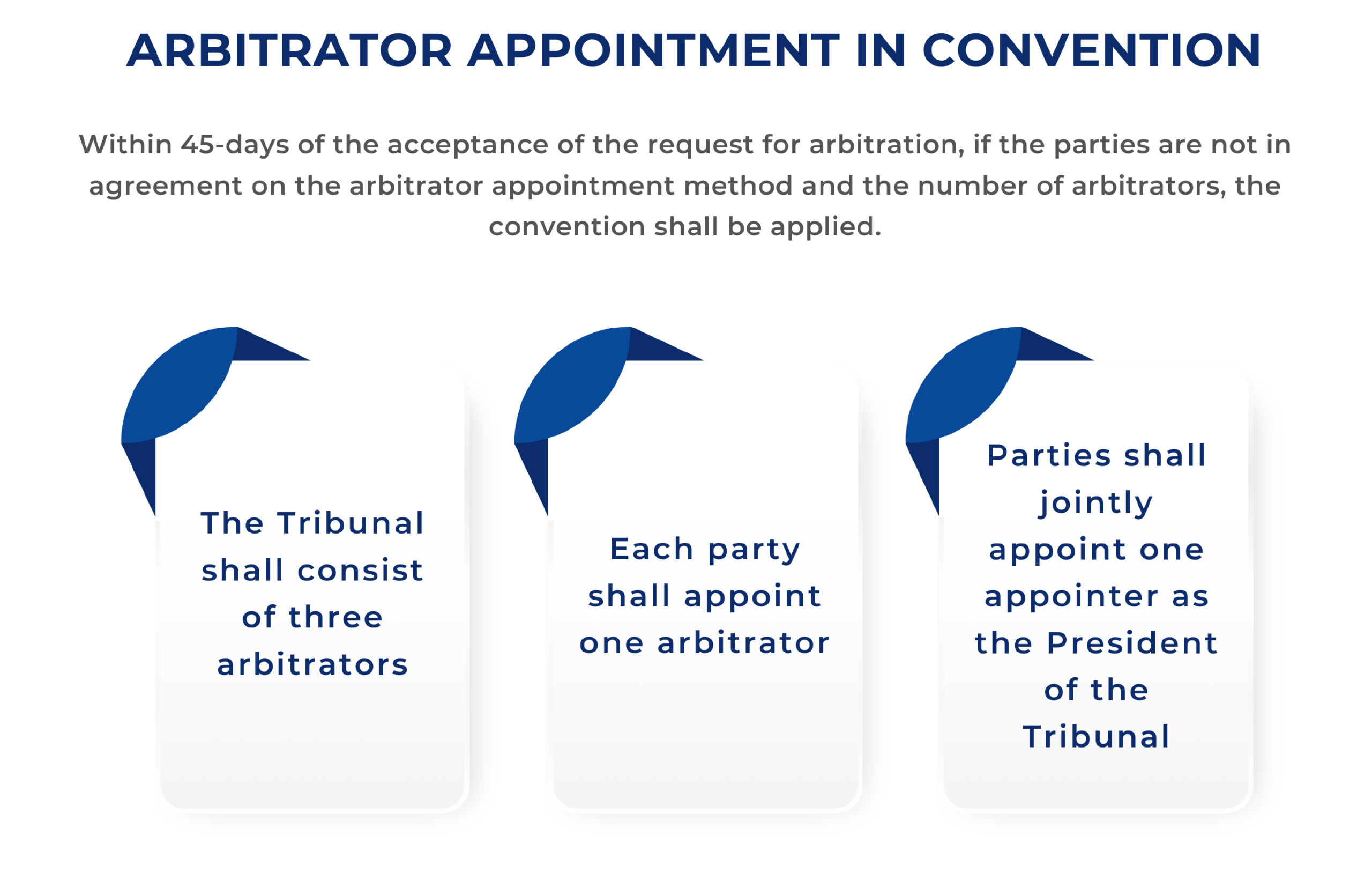
Arbitrator Appointment
Arbitrator(s) shall be appointed upon the determination of the arbitrator appointment method and number of arbitrators. If parties could not appoint arbitrators based on the agreed method, the appointment method in Convention shall be applied
While the ICSID Convention does provide the requirements on nationality and standards for appointment of the Arbitrator, involved parties are allowed free rein in their appointment of Arbitrators.
Within 90-days of the acceptance of the request for arbitration, if the arbitral tribunal is not established due to the failure parties to appoint arbitrators, either of the parties may request the Chairman of Administrative Council (AC Chairman) of ICSID to make the appointment for vacant positions[9]
Establishment of the Arbitral Tribunal
The Arbitral Tribunal is deemed to be established on the date the Secretary–General notifies the parties that all the arbitrators have accepted their appointments and signed the declaration[10]
The procedure for the establishment of the Arbitral Tribunal differs depending on whether the establishment of the arbitral tribunal consists of a sole (1) arbitrator or three (3) arbitrators.
Establishment of the Arbitral Tribunal consists of the Sole Arbitrator
Overall, the procedure for the establishment of the arbitral tribunal consisting of a sole arbitrator is fairly simple.
The Parties may agree to either jointly appoint the sole arbitrator or request the Secretary–General to appoint the sole arbitrator. In either case, the appointment of an arbitrator must be made within 90-days of the request for arbitration being accepted.
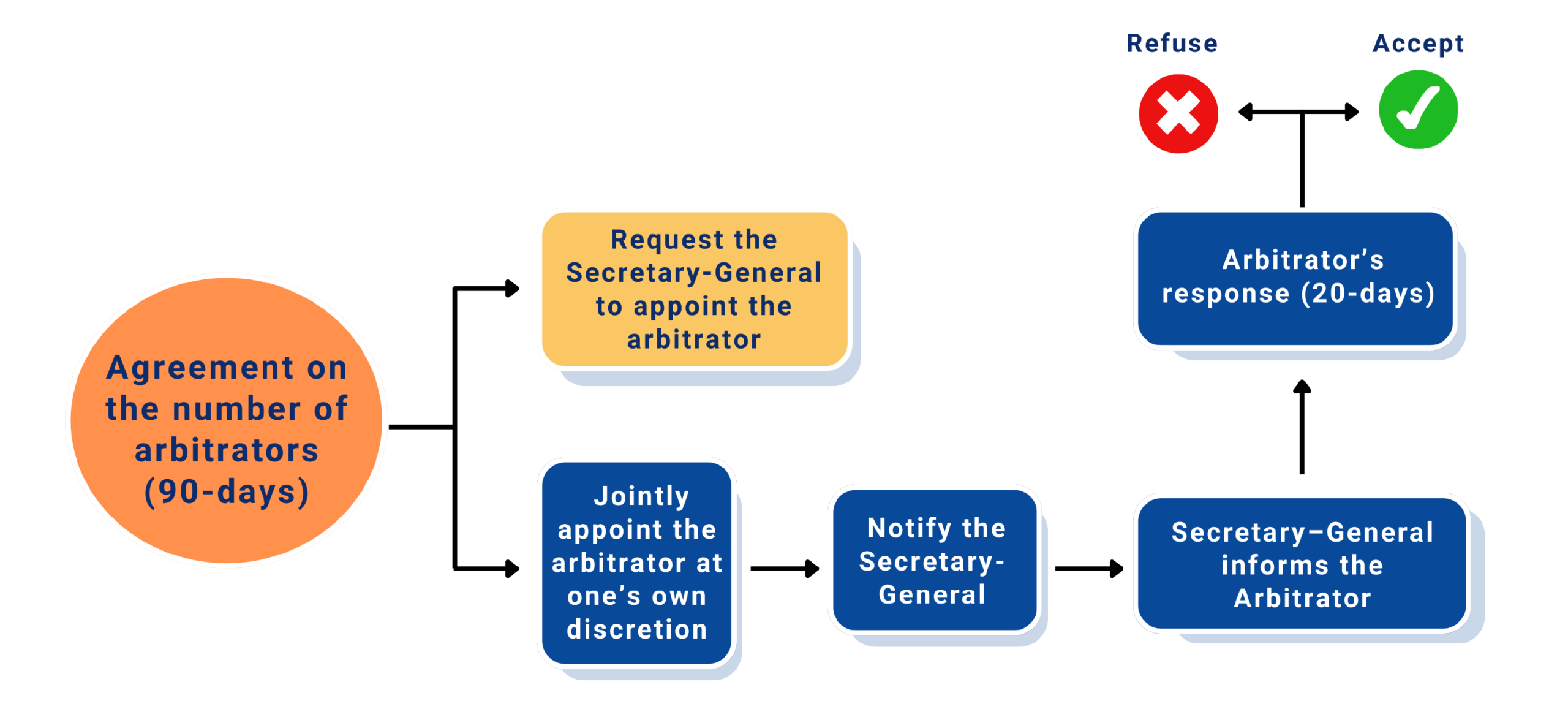
Procedure for the establishment of the arbitral tribunal consisting of a sole arbitrator
Establishment of the Arbitral Tribunal consisting of three (3) Arbitrators
If the parties haven’t yet agreed on the number of Arbitrators, Article 37(2)(b) shall be applied. Accordingly, an Arbitral Tribunal consisting of three (3) Arbitrators must be established within 45-days of the request for arbitration being accepted. Each party will appoint one Arbitrator, and the parties jointly appoint the third arbitrator as the president of the Arbitral Tribunal. Furthermore, the parties may request the Secretary–General to appoint the presidential Arbitrator of the Arbitral Tribunal.
If the Arbitral Tribunal is not or has not been established within 90-days of the request for arbitration – or any other period agreed upon by the parties – the AC Chairman shall appoint those arbitrators not yet appointed per the request of either of the parties. After filling the vacant positions in the Arbitral Tribunal, the AC Chairman appoints one of the arbitrators as the President of the Arbitral Tribunal.
The process of appointing arbitrators is best illustrated as follows in the tables below:
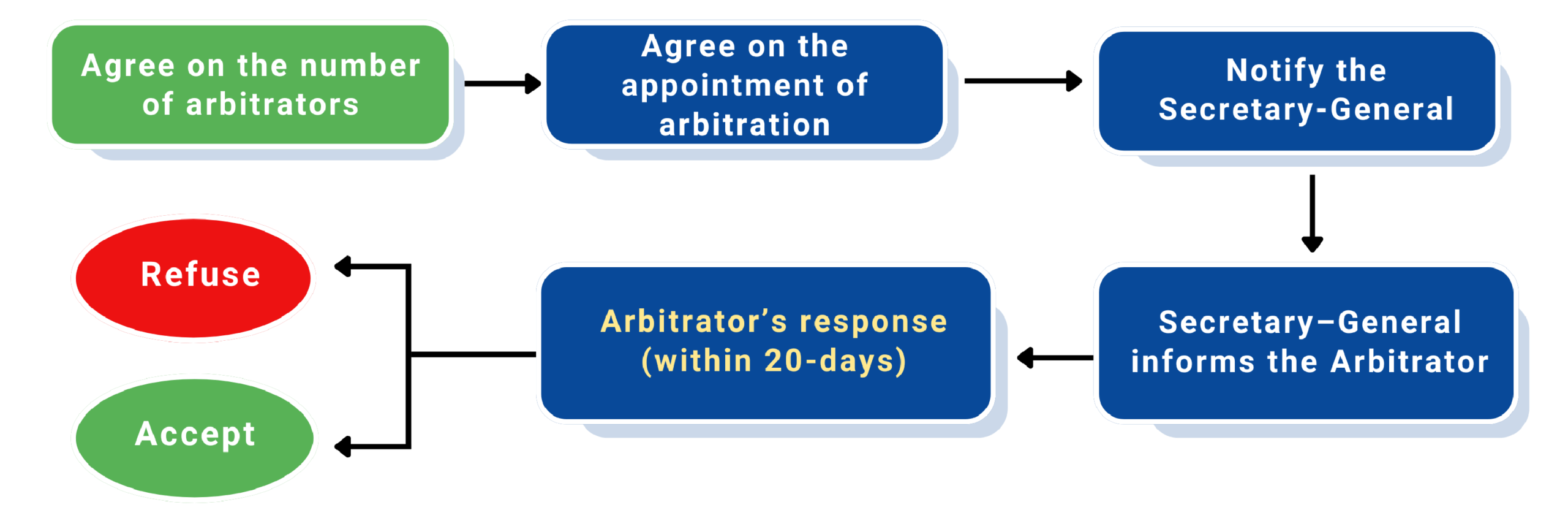
If parties have agreement on arbitrator appointment
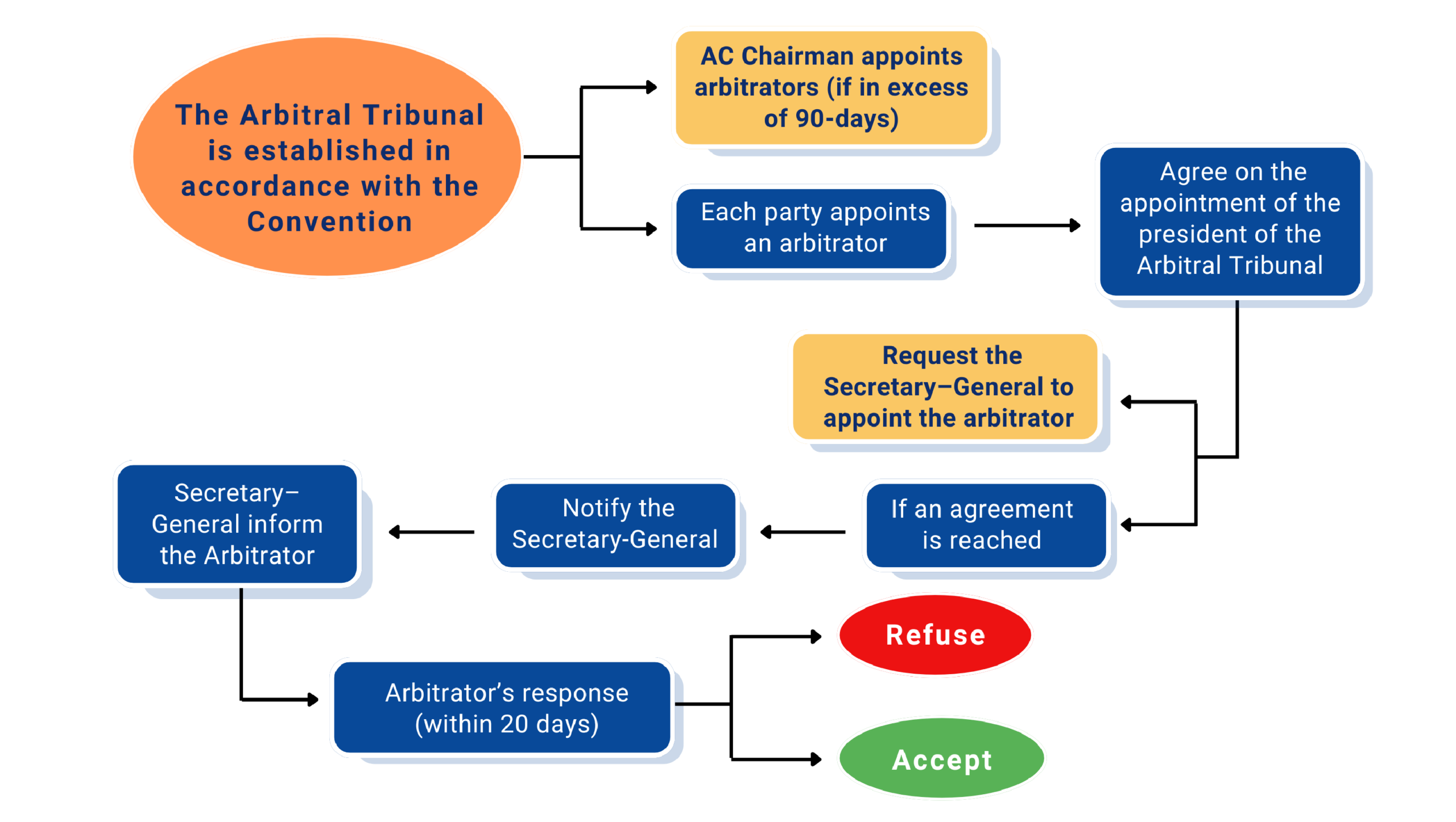
If parties do not have agreement on arbitrator appointment
Conduct of the Proceeding
First Session held by the Arbitral Tribunal
Upon establishment of the Arbitral Tribunal, the Secretary-General shall transfer the documents, materials, and information pertaining to the dispute to the Arbitral Tribunal based on Rule 21 of Arbitration Rules. Afterwards, the Arbitral Tribunal holds the first session with the involved parties
In the first session, the Arbitral Tribunal sets the schedule and specific procedural matters for the case. Specifically, the Arbitral Tribunal confirms the agreement or perspectives of the parties on procedural matters such as the applicable arbitration rules, language, place of hearings, and the procedural calendar[11]
Afterwards, any agreement reached by the parties or any Tribunal decisions on the procedures are recorded in Procedural Decision No. 1, which will later be issued after the first session. These agreements and decisions are signed by the President of the Arbitral Tribunal and will be issued to the parties within 15-days after the first session.
It may be considered that, the first session in ISCID arbitral proceedings is fairly similar to the case management conference in ICC Arbitration Rules. Both of these address fundamental matters relative to location, proceeding language, the scope of arbitration, etc., as well as the issue of Procedural Decision No.1 recording the confirmation of the parties in the session/conference.
Subsequent to the first session, the Arbitral Tribunal proceeds with the two most important phases of the arbitral proceedings – written submissions and hearings.
Written Submissions
The Process for Written Submissions is divided into two phases:
First Phase: the Claimant files the memorial, and the Respondent files the counter-memorial
Second Phase (unless the parties agree otherwise): the Claimant files the reply and the respondent files the rejoinder
The memorial contains a statement of relevant facts, laws and arguments, and a request for relief. The counter-memorial contain content similar to the memorial plus an admission or denial of facts stated in the memorial of the Claimant.
The reply and rejoinder by the parties is limited to responding to the previous written submission and addressing any relevant facts that are new or could not have been known prior to filing the reply or rejoinder.[12]
Hearings
At the hearings, various tasks are performed and these tasks are divided into three (3) phases:
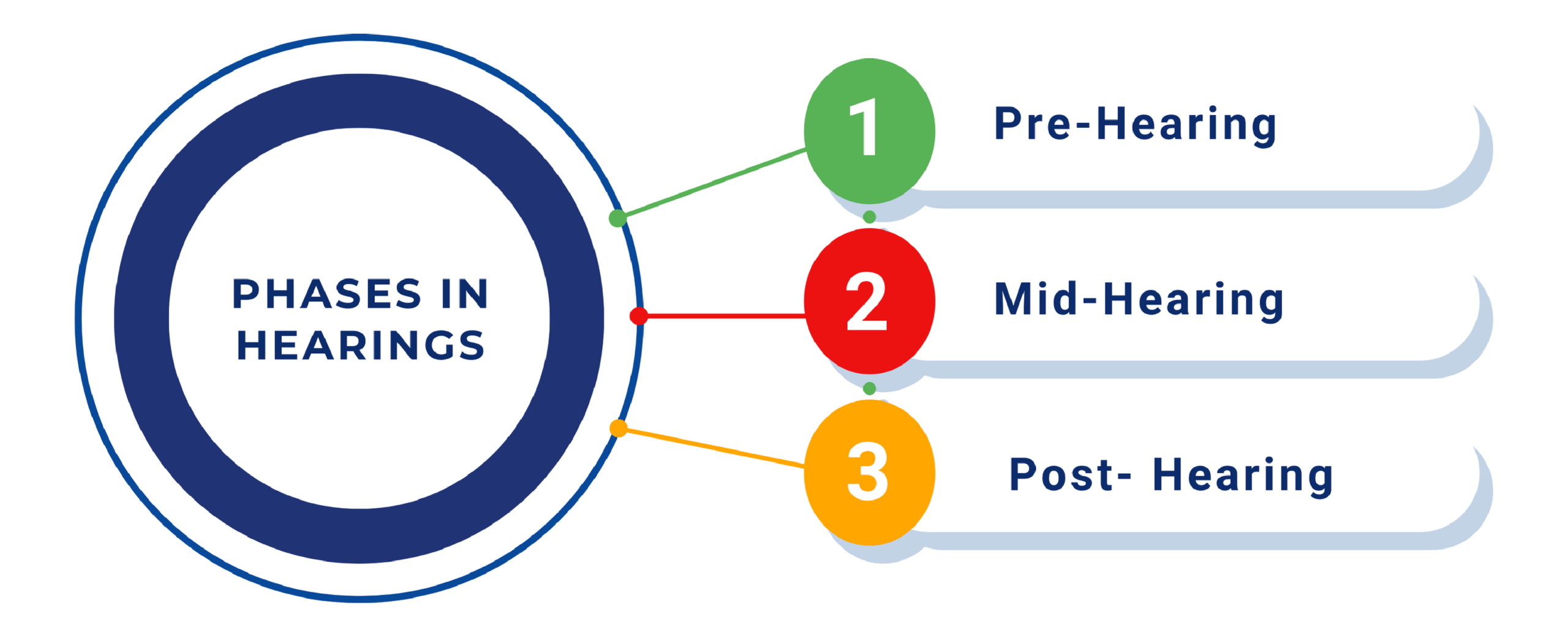
3 Phases in Hearings
(i) Pre-Hearing
Prior to the hearing, ICSID arranges for the preparation of works after consulting with the parties and the arbitral tribunal. These works primarily include preparation of the hearing room, interpreters, etc.
(ii) Mid-Hearing
During the hearings, activities related to arbitral proceedings take place, including public access, witness testimony, recording of the hearing. Details on these activities are specified in the Arbitration Rules
(iii) Post-Hearing
The Arbitral Tribunal requests that each party file a statement of its costs and a written submission on the allocation of costs prior to allocating the costs between the parties.[13]
After the hearing, the Arbitral Tribunal considers both parties’ arguments and renders the Award.
Rendering of the Award
Only one award is rendered for a dispute and this award is considered the ultimate decision of the Arbitral Tribunal. Decisions such as those relative to provisional measures, etc., are not considered as an Award. The award is final and binding on the members of the Convention.
The Rendering of the Award must be made based on the votes of the members of the Arbitral Tribunal and the Award must be signed by all those who voted for it.
Awards are deemed to have been rendered on the date of the dispatch of certified copies of the Award by the Secretary-General.
Post-Award Procedures
Awards are final and binding on the parties. Parties may only resort to the remedies provided for in the Convention and shall not appeal either to national Courts or under other international conventions.
Remedies provided for in the Convention include:
(1) Rectification of the Award;
(2) Interpretation of the Award;
(3) Revision of the Award;
(4) Annulment of the Award.
Through the above is a rudimentary analysis, it has been demonstrated that the arbitral proceeding established by ICSID is relatively complete and detailed, sufficient to resolve disagreements and disputes between investors and host countries. This safeguards the interests of foreign investors, instilling confidence in their international investment activities, but also helps reduce the likelihood of a breach of agreements, and a breach of investment protection principles, thereby maintaining a healthy and effective investment environment.
Download the PDF version of this article here: Investment dispute resolution under ICSID Arbitration
Managed by
 |
Ms. Kieu Nu My Hao | Associate
Phone: (84) 28 6276 9900 Email: hao.kieu@cnccounsel.com |
 |
Mr. Bui Doan Minh Tri | Intern
Phone: (84) 28 6276 9900 Email: tri.bui@cnccounsel.com |
[1] The World Bank, Who We Are, <https://www.worldbank.org/en/about/unit
[2] ICSID, About ICSID, <https://icsid.worldbank.org/About/ICSID>
[3] ICSID Institution Rules, Rule 1 (1)
[4] ICSID Convention, Article 36 (1) and Article 36 (2)
[5] Article 25 of ICSID Convention lists three conditions in total, namely:
(i) Disputes must be between a Contracting State and a national of another Contracting State
(ii) The disputes must be any legal dispute arising directly out of an investment. Any disputes that aren’t legal in nature such as political dispute, economic disputes,.. are not within the scope of the Convention
(iii) The Host Country and the Foreign Contract must consent to ICSID’s jurisdiction to resolve the dispute
[6] ICSID, Screening and Registration – ICSID Convention Arbitration (2022 Rules) <https://icsid.worldbank.org/procedures/arbitration/convention/screening-registration/2022>
[7] ICSID Convention, Article 37(1)
[8] Arbitration Rules, Rule 15(2)
[9] ICSID Convention, Article 38 and Arbitration Rules, Rule 18
[10] Arbitration Rules, Rule 21
[11] Arbitration Rules, Rule 29(1)
[12] Arbitration Rules, Rule 30
[13] Arbitration Rules, Rule 51
To make any contribution, amendment to the content of this article or to request for further support from CNC, please contact:
CNC© | A Boutique Property Law Firm
The Sun Avenue, 28 Mai Chi Tho, An Phu Ward, Thu Duc City, Ho Chi Minh City, Vietnam
T: (+84-28) 6276 9900 | H/L: (+84) 916 545 618
Disclaimers:
This article was prepared and used for the purpose of introducing clients to or updating clients on issues and/or developments of legal perspectives in Vietnam. Information presented in this article shall not constitute advice of any kind and may be subject to change without advanced notice.



